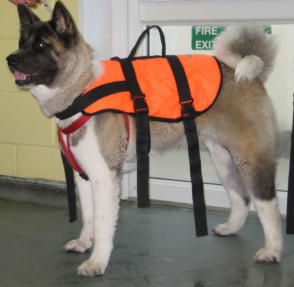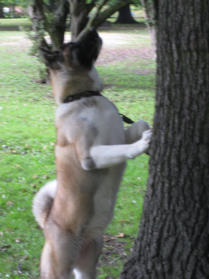

© copyright Dog-Panions 2025
DOG-Panions MOB: 07807 377920


Diet
Again it is important to think about your dog’s origins. The Japanese dogs were primarily fed on
fish based diets, so it is important to include this. Fish is a good form of low fat protein with
essential oils such as omega-3, 6 and 9 which play a crucial role in keeping joints supple and
flexible (essential considering Akita’s are prone to arthritis in later years). As well as keeping the
heart healthy and coat in good condition. (Mackerel, herring and salmon are a good source of
these essential oils).
The quantity of food needed changes with the dogs age and activity levels. Always get advice
from your vet, re-homing centre or breeder so a feeding programme can be tailored to your
dog’s needs. Also remember – Just like us , dogs are partial to extra little treats! Canine obesity
in on the increase in all breeds, Akita’s with their broad build and thick coats can hide additional
pounds easily ! Treats , should be just that... occasional tasty extras. Take this into account
when using food reward based training.
Coat care
Akita’s have a gorgeous thick double coat,
with a very dense soft undercoat for insulation
in the cold, and a longer coarse waterproofing
coat, ideal for the snowy mountains of Japan.
Although they don’t constantly shed - a
weekly brush through should keep their coat in
good condition, they do completely lose their
under coat twice a year – usually in spring
then at the end of the summer
and it will make a mess !!!
The fur will start to lift away from the body and loosen leaving deposits wherever they sit or
brush against, daily grooming to get rid of this loose fur is crucial to keep your dog comfortable
and your home tidy. It generally only lasts a couple weeks after which a new soft coat grows in.
However a good way to manage this is; as the fur starts to lift, book them in to a recommended
professional groomer to get rid of the bulk of the loose fur in one go. If this is an option for you
get your dog used to being groomed by yourself or a professional groomer as a puppy.
Illness’s
If your dog is lucky it will have a long happy life of between 10 and 12 years. But it is wise to
consider the possibility of health issues. Like many pedigrees, the Akita has a number of
potential health concerns. Below are some common conditions, this is not to say that every
Akita will suffer from these, it is just worth being aware that some do.
Thyroid diseases
The thyroid gland is responsible for producing the hormone “Thyroxin”, needed to control the
bodies metabolic rate (the rate at which various functions are carried out within the body).
Hy“PO”thyroidism or low thyroid activity occurs when there is a problem with the gland
resulting in a reduced secretion of thyroxin. Hy”PER”thyroidism, which is an increased
production of the Thyroxin hormone. If correctly diagnosed through blood tests, treatment is
available in most cases.
Bloat
Many large and deep chested breeds are prone to bloat; this is a build-up of gas produced in
the stomach from food digestion causing the stomach to “Swell or Bloat”. Occasionally a build-
up of gas can cause the stomach to twist on itself cutting off the openings and trapping the gas
further. This becomes extremely painful and will usually need the gas venting from the
stomach. - This condition can be critical and requires immediate veterinary care.
Arthitis
Arthritis is a condition which causes pain and inflammation within one or more joints. Although
it is common amongst many breeds and is generally (though not always) associated with
ageing dogs due to wear and tear of the joints. Larger breeds like the Akita have a tendency to
develop it.
The symptoms are varied, but generally the pain and inflammation causes stiffness in the joints
resulting in restricted movement and lameness, often seen after periods of rest. This will also
have an impact on their behaviour, such as showing reluctance to partake in their usual
activities and increased irritability and lethargy.
PRA
Progressive Retinal Atrophy (PRA) is a condition whereby the cells within the eye retina
degrade progressively, eventually causing blindness. If affected, the dog will show signs around
the ages of 5-6 years.
As this is thought to be a hereditary trait in the Akita there is no cure for this condition.
Sebaseous Adenitis
Sebaceous glands are found all over the body secreting sebum - fatty oils which keep the skin
from drying out and the coat in good condition. Sebaceous Adenitis is a condition where these
glands become inflamed and destroyed causing a loss of sebum production in the areas
affected. The skin dries out becoming scaly and prone to infection as well as causing fur loss.
Various bathing oils to remove scaly deposits, and fatty oil dietary supplements may help to
manage the condition.
Sadly little is known about this condition and a cure is not yet available.


Exercise
On lead activity is good exercise if you dont have a safe area to
run your dog, schedule in 2-3 long walks and make these more
stimulating by allowing your Akita to sniff out things as they go
utilising their natural hunting skills, and burning additional
calories by concentrating along the way.
Nothing beats a good run around. Make sure the area you use is
safe - and ensure good socialising, training and recall before
letting any dog play off lead.





NB:
Invest in some good winter clothes - once their
in the snow you cant get them out of it!
Hydrotherapy may be recommended as a non
weight bearing activity for dogs with arthritis.
It can help maintain joint strength and has the
added bonus of providing a less painful type of
exercise which can help to keep your
dog at a healthy weight.
Your Veterinary Surgeon can refer you to a
specialised centre if deemed suitable.
I can personally recommend :
http://www.albaphysiotherapy.co.uk




























